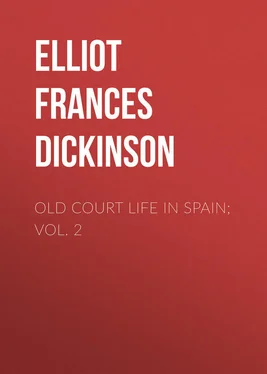Frances Elliot - Old Court Life in Spain; vol. 2
Здесь есть возможность читать онлайн «Frances Elliot - Old Court Life in Spain; vol. 2» — ознакомительный отрывок электронной книги совершенно бесплатно, а после прочтения отрывка купить полную версию. В некоторых случаях можно слушать аудио, скачать через торрент в формате fb2 и присутствует краткое содержание. Жанр: foreign_antique, foreign_prose, на английском языке. Описание произведения, (предисловие) а так же отзывы посетителей доступны на портале библиотеки ЛибКат.
- Название:Old Court Life in Spain; vol. 2
- Автор:
- Жанр:
- Год:неизвестен
- ISBN:нет данных
- Рейтинг книги:3 / 5. Голосов: 1
-
Избранное:Добавить в избранное
- Отзывы:
-
Ваша оценка:
- 60
- 1
- 2
- 3
- 4
- 5
Old Court Life in Spain; vol. 2: краткое содержание, описание и аннотация
Предлагаем к чтению аннотацию, описание, краткое содержание или предисловие (зависит от того, что написал сам автор книги «Old Court Life in Spain; vol. 2»). Если вы не нашли необходимую информацию о книге — напишите в комментариях, мы постараемся отыскать её.
Old Court Life in Spain; vol. 2 — читать онлайн ознакомительный отрывок
Ниже представлен текст книги, разбитый по страницам. Система сохранения места последней прочитанной страницы, позволяет с удобством читать онлайн бесплатно книгу «Old Court Life in Spain; vol. 2», без необходимости каждый раз заново искать на чём Вы остановились. Поставьте закладку, и сможете в любой момент перейти на страницу, на которой закончили чтение.
Интервал:
Закладка:
From this moment to the end of the pageant he hardly addresses himself to Blanche or turns towards her, but with an angry scowl, his steely eyes wander unceasingly over the crowd of brilliant knights who, singly or together, gallop past the royal estrado to salute him and the queen.
Spite of herself, Blanche, revived by the strong essences Claire used to restore her, begins to be attracted by the brilliant show. She is the chief figure in this mimic war; the noblest dames of Castile are there to do her homage; the queen-mother comforting her with gentle words, and when Claire, who stands behind her chair, whispers into her ear, “Do you see him, there under the flag-staff in the centre? He wears a long white mantle over his armour, and your scarf upon his arm. Oh! is he not charming?” a mist passes before her eyes, the tell-tale colour mounts to her cheeks, and forgetting Don Pedro and all her fears past, present, and to come, she leans forward, a wild look in her eyes, towards the spot where Don Fadique has reined up his charger, to head the knights of Santiago preparing to salute the king and the new queen. This passed in an instant, but not before Don Pedro had noted it, and his naturally pallid face grows white with rage.
“Madam,” says he, addressing Blanche for the first time, who, at the sound of his harsh voice, starts back aghast, “it seems that the favour you deny me, you accord to my brother. Happy youth! Doubtless he will know how to profit by it.”
Utterly unable to reply, Blanche shrank back, as if about to faint, but terror so far gave her strength that she found voice to reply that at Narbonne it was her duty towards his Grace to receive his brother well.
“I doubt it not, madam,” answers Don Pedro with a bitter sneer. “Yes, at Narbonne you made good use of your time, doubtless. I was a cursed fool to send him there,” he mutters. Then, turning his back upon her, he addresses himself to Don Juan, the big tears streaming slowly down poor Blanche’s cheeks.
Alas! alas! This insult seems the last drop in her cup of misery. Poor little queen! her heart is bursting, and nothing but her horror of the king, whose cold eyes follow her wherever she turns, prevents her sobs from being heard by all the court.
At this moment, amid the blare of trumpets, the roll of drums and clash of cymbals, the chimes of all the bells of the city clashing, and the frantic shouts of the mob, pressing forward at every point where they can find standing room along the barriers, a gallant company of knights, attended by their esquires, galloped into the centre of the field in a general mêlée ; the Knight of the Dragon, Don Juan de Cerda – who, could he have foreseen the future, would then and there have forfeited his fealty to a recreant king; the Knight of the White Rose, Don Diego de Guzman; the unknown knight, his turban protected by chains of finest steel interwoven with the folds of dazzling white, and white his tunic and mantle, on his left arm a shield, in his right hand a slender lance, mounted on a raven-black charger, and attended by two slaves in Moorish dress, black from casque to toe, his visor down – said to be the Moorish king of Granada, Ben Hade, come in disguise, to break a lance with the Christians; the two Medinas, Celi and Sidonia, a tribe of Aguilars, every man of the name a hero in the track of war, the de Cuevas, Cipuntes, Cabras, Perez del Pulgar, and the great southern noble, Ponce de Leon, arrived from the plains of Xeres, where he ruled more powerful than the king; the judges of the lists, stranger knights, marshals, swordsmen, bowmen; pages, gorgeous in silk and samite, heralds in gold and embroidered tabards; and last, and chiefest, in splendid armour, the Lord of the Tournament, the Grand Master de Santiago, attended by the knights of his order in the absence of the king.
Small of stature, but light and elegant, his heavy accoutrements can not conceal the grace of every movement, or the mastery with which he manages his horse, a fiery chestnut, curveting and prancing, as he takes his place in the centre of the lists amid cries of “ Plaza! Plaza por los Infante! Santiago! Santiago! ”
Conscious that Blanche’s eyes are upon him, and knowing nothing of what has just passed between her and Don Pedro, and that her poor little heart is melting in fear, he takes advantage of every opportunity to place himself before the royal pavilion, thirsting for one look of her sweet eyes, a gesture, a sign, to feel the assurance of her love; but he looks in vain.
Many tilts are run. The stranger knight unhorses several riders. When called on by the herald to raise his visor he courteously declines, rides three times round the field, displaying his colours, the Moorish cognisance of yellow on a black ground, then vanishes through the open gates, his black slaves after him. Many sharp blows are then exchanged and wounds inflicted in this mimic warfare, to the delight of the king, who rises to his feet loudly laughing and clapping his hands as the vanquished knights are carried from the field.
Then, to the cries of Dios y España , four cavaliers ride forth, with violet surcoats over their coats of mail, and run a Moorish tilt with reeds instead of lances, an elegant pastime of Granada worthy of the courtly Moslems with whom Don Pedro is so much in league, while stringed instruments strike up a joyful measure, and castanets are played by the gitanos who dance a seguidilla before the king.
Many of the great nobles, offended at the insolent bearing of Don Pedro, have not, as yet, taken their lances out of rest, but have only ridden round at the opening of the lists, at which great wonder is expressed among the spectators, and much discontent amid their followers.
Now, all are in honour bound to break a lance, in the Grande Mêlée , with Don Fadique, who takes his place in the centre of the field. Whether it is out of courtesy to his youth and royal rank, or that, by a kind of miracle, his lady-love being present, his arm is strengthened to do wonders in her eyes, many a famous noble has the worst of it, at which wild cries are again heard of “ Santiago! Viva el Gran Maestro! Viva el Infante! ”
A grand procession ends the tournament, around the golden pole set up in the centre, from which depends a laurel crown woven with pearls, which, according to the rules, ought to be presented to the victor by the young queen. But Don Pedro, in savage mood (for the success of his brother has deeply angered him), has willed it otherwise.
With his large eyes fixed in a disdainful stare he gives no heed to the tilting, and scarcely responds to the salutations of the noble knights who gather under the pavilion.
When Don Fadique stations himself in front to salute him and the two queens, Don Pedro – who at that moment is talking eagerly with the Lord of Monteney, from time to time turning towards Albuquerque, as if to inform him of some important fact – turns and fixes his eyes upon him with such a glare of rage that Don Fadique never advances at all to claim the guerdon he was to receive, and retreats to his tent, the king at the same time suddenly rising, and signalling to the gaudy herald, displaying his particoloured costume in the last rays of the sunset which light up the west, to the delight of the townsfolk, to approach.
Like all the world the herald dreads the king, and comes riding as fast as his horse can carry him.
“Vain knave!” says Don Pedro surveying his brilliant garb, “can you find nothing better with which to fill your time, than serving as a popinjay to the people? Break up the lists. I have had enough of it; and see you do it quickly.”
And now, slowly, as the day falls, along the river bank under the shade of the poplar avenues, passes the procession, winding into the deep and narrow streets of Burgos.
Читать дальшеИнтервал:
Закладка:
Похожие книги на «Old Court Life in Spain; vol. 2»
Представляем Вашему вниманию похожие книги на «Old Court Life in Spain; vol. 2» списком для выбора. Мы отобрали схожую по названию и смыслу литературу в надежде предоставить читателям больше вариантов отыскать новые, интересные, ещё непрочитанные произведения.
Обсуждение, отзывы о книге «Old Court Life in Spain; vol. 2» и просто собственные мнения читателей. Оставьте ваши комментарии, напишите, что Вы думаете о произведении, его смысле или главных героях. Укажите что конкретно понравилось, а что нет, и почему Вы так считаете.












